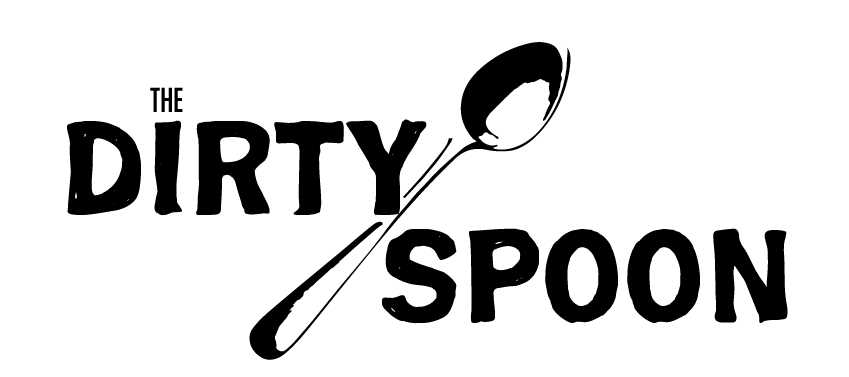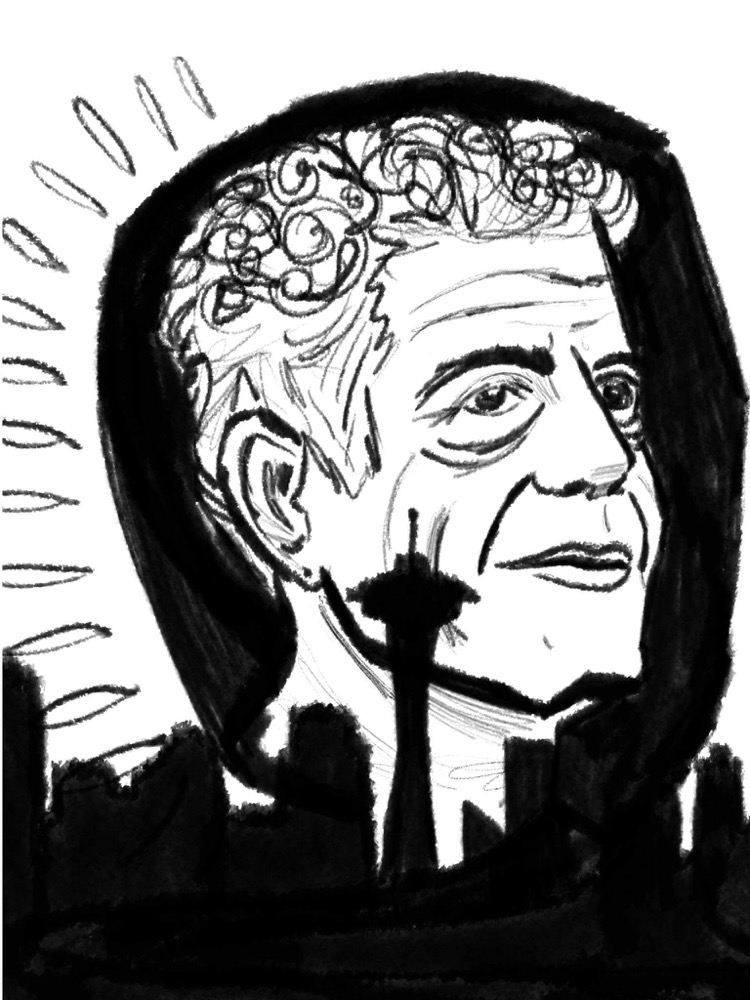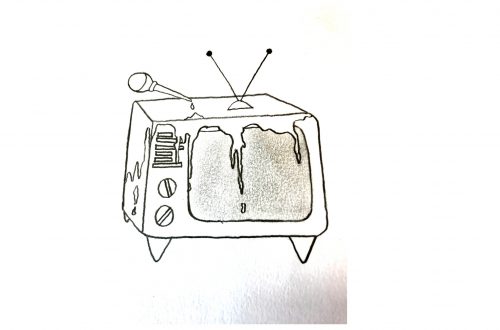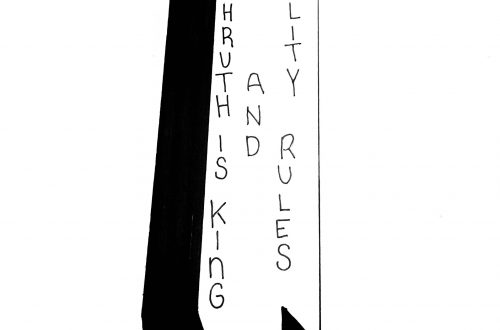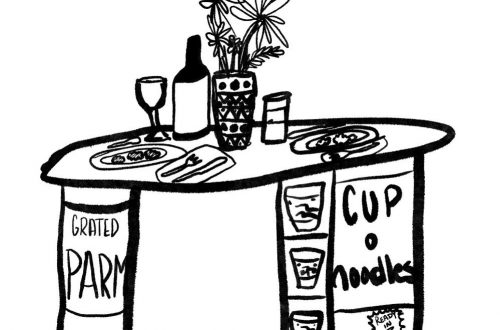by Kirsten Hernandez
Kirsten’s essay appears in episode 29 of The Dirty Spoon Radio Hour.
I believe Anthony Bourdain is the best writer of our generation.
That’s a bold statement, but it’s a statement I stand by wholeheartedly. The fry cook-turned-restaurateur rose to prominence in 2000, with the release of his book Kitchen Confidential, a provocative look into what he refers to as the “culinary underbelly.” Although Bourdain has been frank about the fact he wrote the book for industry professionals to get a laugh by saying the quiet parts out loud, it became an overnight mainstream success. Informing the public on topics like the sexual exploits of the people cooking your meal and why you should stop eating restaurant fish on Mondays –spoiler alert, because it’s five days old and disgusting– he did so with his uniquely crass yet thoughtful voice.
An executive chef at Brasserie Les Halles, a restaurant most of us could never afford, it came as a surprise when he allowed us to see into this foreign world. With so much of American food culture falling into the categories of ethnocentrism or patronization in the name of “accessibility” to mainstream audiences, Bourdain was never dogmatic and treated us like the adults we are by allowing us to draw our own conclusions about the things he showed us. He was opinionated, but he gave equal (sometimes even more) respect and analysis to street food as he did fine dining and would regularly state he was “the only person who didn’t give a shit” about the status of the person sitting with him at the table. He seemed to also be the only chef of status to treat their kitchens as egalitarian entities; everyone from busboys and waiters to line cooks should, and did, get treated with dignity and respect.
Unlike most on the upper echelons of chefdom, he put himself on full display. Skipping the cultural norm of pleasantries was a frequent event as he ripped into others for what he perceived was dishonesty manifesting in many forms. He was fine with making enemies just as much as he enjoyed making friends – and had plenty of each. More often than not, he was unafraid of grounding himself in front of his audience, dispelling the notion that he was a mythical celebrity and more like someone, for better or worse, we could relate to. Medium Raw featured an out of place chapter about he’d given up “being cool” after the birth of his daughter, and the Massachusetts episode of Parts Unknown featured him speaking frankly about his recovery from heroin addiction in a support group.
More often than not, he was unafraid of grounding himself in front of his audience, dispelling the notion that he was a mythical celebrity and more like someone, for better or worse, we could relate to.
My reintroduction to Parts Unknown came during my perpetual state of pandemic unemployment. My two-month backpacking jaunt through the European continent was canceled a week before it was supposed to begin, and I was trying to fill the hole I had to not just see the world, but even experience it outside my living room.
The secondhand experiences of the culture, food, and atmosphere somewhat satisfied the hunger I had for seeing the world. In many ways, it was more satisfying witnessing the beauty of what life had to offer through someone else’s lens, a viewpoint made more sophisticated than my analysis could ever be. The experience and sage commentary of his adventures made it feel like he was not only a spokesperson for the communities he visited but gave the metaphorical microphone to the people themselves. Above all else, audiences connected with the allyship so often missing from the discourse of white American travelers. He was more than just a TV personality to me; he was a role model for how I should move through the world with an inquisitive mindset. To him, we weren’t here to dominate but rather, let the lessons we learned from the rest of humanity shape who we were.
Aside from witnessing the brilliance Bourdain brought to our television screens, it seemed impossible for me to separate his escapades with his untimely passing just years before.
I couldn’t shake the psychoanalysis I was prone to, trying to pick apart the perceived misery, looking for signs of his unhappiness. I squirmed every time the man joked about wanting to kill himself, emotional when he mentioned his beloved daughter, and felt secondhand pain in a particular episode in Sicily where he ran away from the production crew after having a crisis of self-confidence.
Despite wanting to have fun, revisiting the adventures of someone I so loved and admired shoved me farther into a state of existential darkness with each episode.
He was more than just a TV personality to me; he was a role model for how I should move through the world with an inquisitive mindset.
The news of his death shocked us all: an announcement so profound it expanded beyond the culinary world, spanning professions and generations. Everyone from presidents, celebrities, dignitaries, and even chefs, those to whom he dedicated chapters of volatile criticism, came out to acknowledge the talents he shared with the world. To most, he was more than just another celebrity chef with a reality show; he was someone who showed us his soul, someone interested in sharing things we would have never seen by ourselves. A friend who put his integrity before his stardom. No one like him came before and no one has come since, leaving a void in pop culture and in our collective consciousness.
I feel many of us lost a sense of purpose and adventure over the course of the past year. Our wings had been clipped – for good, noble and necessary reasons – but it didn’t prevent the creeping feeling of being “stuck.” I had forgotten, after a year and a half, how to be a global citizen, to enjoy life beyond my home after being told for so long that life beyond my walls was dangerous, life-threatening. I wanted to relearn how to be a part of our quick and curious society again and I saw no other way but to follow the example of someone I considered to be a master. So I took a train into Seattle and embarked on my effort to recreate the food tour seen in season 10 of Parts Unknown.
I wanted to relearn how to be a part of our quick and curious society again and I saw no other way but to follow the example of someone I considered to be a master.
Putting on a patterned dress, rouge matte lipstick, and my flattened hair in a velvet headband, I left the dilapidated house I called my Airbnb and walked through the streets of the Capitol Hill district in search of Mamnoon.
The restaurant, specializing in Lebanese cuisine, was dimly lit, accentuated with multicolored glass-blown light fixtures and 50 ceramic flying pigs descending from the ceiling, representative of a story originating from Middle Eastern mythology. The waiters were friendly, eager to describe what laid before me on the gold-tinted tin plates. The dining room was still at half capacity, allowing for the rare gift of hearing my own thoughts as I focused on what I was eating. For the first time in what felt like forever, in an effort to reintroduce myself to the cultural idea of fine dining, I closed my eyes as I took a bite: a mixture of various herbs, lime toum, and the flaky crust that clung to molten cheese rolls topped with garlic molasses. For a minute, I let myself be taken away with enjoyment, trying to soak in not only the fact that I was partaking in one of the best meals I’ve ever had, but that I was outside again and I wasn’t afraid. It was an almost inconceivable thought just a few weeks earlier.
After a moment of bliss, I realized where I was sitting: less than six feet from where he sat. The thought of him sitting for dinner, giggling hysterically with his weed farmer guests after “sampling their product” was all I could think about. A sadness loomed over me at every stop.
I couldn’t help but feel confused and upset and a little angry. As someone who has tried taking their own life, I should have a better idea, or a more nuanced view, on what it’s like to be in that mindset. I couldn’t help but think about myself at 17, convincing myself that if I worked harder or was more talented, I could be someone who wouldn’t want to die. I told myself that maybe if I got to live my dream life – one of friends, food, and travel – that maybe I’d be happy enough to want to stay. Reliving the moments I had seen him in less than a year before his passing addled my brain because it was so hard to remember that nothing on Earth could end those feelings, not even when you have the everyday life of someone’s fantasy.
I forgot that suicidal thoughts are unavoidable moving goal posts.
At every stop on my tour, I made it a point to ask the restaurant workers what he was like, if he was anything like what we saw on television. The consensus was that he was even better than we could have guessed from afar. The waiter at Mamnoon told me Bourdain’s favorite dishes and that he personally thanked the kitchen staff. The fry cook at the Pacific Inn, busy salting French fries, took a quick second to duck around the corner and proclaim giddily, “He was so fucking cool!” before saving the bubbling spuds from scorch. The best story came from the owner of Taylor’s Oyster Bar, who asked an exiting Bourdain to sign his copy of Kitchen Confidential. Instead, he got a hand drawing of a kitchen knife, a thinly veiled excuse to humor his producers to score a few extra minutes to talk to the man about his life as a restaurateur. Before leaving, Bourdain approached the restaurant’s publicist to ask quietly if he could smell her baby, acknowledging that it was a weird request but telling her that it was his favorite smell in the world. She, of course, gladly obliged.
Before leaving, Bourdain approached the restaurant’s publicist to ask quietly if he could smell her baby, acknowledging that it was a weird request but telling her that it was his favorite smell in the world.
After all the anecdotes, the light that came to the faces of those recalling their encounter, the luminescence dimmed when nearly all of them said the same words:
“I don’t know why he did what he did.”
Some excused themselves back to work, some choked up. But the conclusion was the same: the man was loved. The fact that he was gone for reasons none of us understood caused a visceral reaction in those even on the periphery of his life.
It wasn’t until I arrived at Bourdain’s final Seattle stop, the Shanghai Room, that I confronted my initial mindset. Sitting with friends in a booth adjacent to the bar, smacked out of our minds eating French toast at 9:30 PM and watching Leprechauns on the projector screen behind us, I realized that this was the takeaway from his life’s work. I traced his steps through the Emerald City, walking through the same doors, eating the same food, and experiencing the same people, forgetting to proceed with the same amount of joy, of curiosity that made the man we knew so special. Food, he taught us, was meant to be something that brings us together; food was something that sparked joy and started a conversation amongst both friends and total strangers. Whether it was Jollibee or NOMA, Bourdain’s work taught us that what was on the table was just as important as who was sitting around it. When we consume his work dwelling on the end rather than enjoying the now, we miss that lesson entirely.
I traced his steps through the Emerald City, walking through the same doors, eating the same food, and experiencing the same people, forgetting to proceed with the same amount of joy, of curiosity that made the man we knew so special.
It isn’t possible to entirely eliminate the circumstances of his passing from the conversation. Doing so is a contribution to the age old cultural ideal that suicide is too dark, too taboo a topic to speak aloud. It is possible, comparatively, to center the conversation around his legacy, the things he did while he was here that made him so adored by those who knew him through himself or his works.
Anthony Bourdain doesn’t require an asterisk by his name, an addendum wondering why his demons drove him to the end. The thing is, we won’t ever know the why.
Trying to figure out who he “really was” behind the camera is a disservice to his memory because he always wore his heart on his sleeve: he was the baby smeller, the man who’d fight for the fair treatment of wait staff, the one who would show up late to his next location because he took the time to draw a knife in a restaurant owner’s book just to buy time to talk.
Bourdain is the greatest writer of our time because unlike others more focused on hubristic endeavors, he was consistently and unapologetically himself, showing his passions, his fears, his loves to us all. By extension, he taught us that it was OK to show our passions, fears and loves. That was the vulnerability that made us fall in love with him. The way we honor his memory is by speaking of him in that light — the light of kindness, humor and humanity and by choosing to live our own lives in the same manner he did, wandering steadfast into the great unknown.
Original artwork by Alex Knighten

About the Author
Kirsten Hernandez is a comedy writer and essayist in Southern California.
